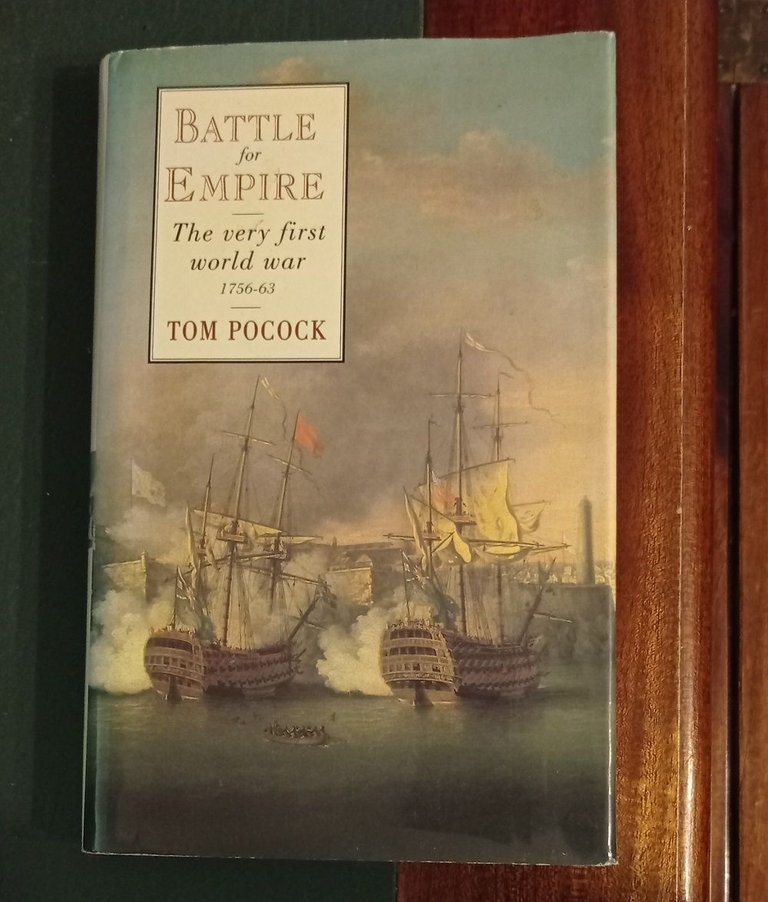I always seem to end up doing reviews of history books. Well, here's another one ! 😁

Photo by me, of my copy of the book

Most people think that there have only been two world wars. Three if you include the rapidly escalating one that seems to be underway right now.
But there is another war that arguably counts as the true First World War, and that's the Seven Years' War. While Prussia (aided by a British army in Hannover) slugged it out against most of the other European powers on land, Britain fought France and Spain across almost every continent and ocean. That's what made it a world war, even more so than the Wars of 1776-83 (England vs Everyone, America was a sideshow) or the Napoleonic Wars.
The Seven Years War was the point in history where the Royal Navy proved that England ruled the waves (at least for a while...).

This book is quite old now, being written in 1998. The author is actually descended from Admiral Pocock, one of the key figures in the war.
Battle For Empire focuses entirely on the naval and colonial parts of the war.
The narrative starts with Admiral Byng's failure to relieve Majorca (then a British possession), and his subsequent execution for lack of boldness in the face of the enemy. While the book never says so blatantly, it's clear throughout that this set an example of British commanders that only a ruthlessly aggressive approach was expected of them.
The book looks in some detail at the campaigns by Pocock and Robert Clive in India, Wolfe in Canada (as well as other North American operations that became the French and Indian War), and the British conquests of Havana and Manila.
The style of writing is detailed, but easy to read. It's probably the closest thing a history book can come to being a "page turner" ! Some of that is because the subject matter itself is dramatic and exciting, but a lot of it is down to the author's skill.

But no book is perfect, of course. With the possible exception of The Lord of the Rings. I have two criticisms of this one.
The first is that it is almost too Anglo-centric. It is fair to say that the author doesn't gloss over English failings, it's just that the French and Spanish seem to exist only to be opponents, and their perspective is rarely considered. The bibliography is heavily weighted towards English sources, with a few Spanish and no French or Indian ones listed.
The second criticism is really more of a preference thing. I wish the book had given the Battle of Quiberon Bay more than a passing mention. Okay it was in the European theatre, but it was still a naval battle.
It really was where the legacy of Byng's execution flowered, and I actually think that even Nelson wouldn't have done what Admiral Hawke did. Taking the doctrine of aggression to it's extreme, he attacked a French fleet that was anchored and protected by reefs and shoals, all in the middle of a violent storm. An utterly crazy risk, but he pulled it off and broke the French navy. Including this in the book would have drawn the narrative that started with Byng to a tidy conclusion.

Despite these minor criticisms, this book is a riveting read. It's beautifully written, with an interesting selection of black and white plates. Covering a war which is virtually forgotten nowadays, I'd strongly recommend it to anyone who wants to understand the events that shaped the second half of the eighteenth and the whole of the nineteenth centuries.

Published in 1998 by Michael O'Mara Book Limited, 272 pages with plates. ISBN 1-85479-332-2